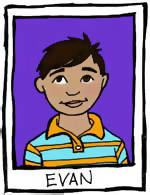What does Ms. Milton need to know about students with visual impairments?
Page 4: The Need for an Expanded Core Curriculum
Having read Evan’s and Emily’s IEPs, Ms. Milton has learned that they will take part in the same core curriculum (e.g., language arts, mathematics, social studies) as their sighted classmates. Ms. Milton has also learned that Evan and Emily have additional instructional needs because of their visual disabilities. These added areas of instruction, commonly referred to as the Expanded Core Curriculum for students with visual impairments, are outlined below:
The Expanded Core Curriculum
- Compensatory skills, or functional skills, including communication modes (e.g., braille, large print, abacus)
- Orientation and mobility skills
- Social interaction skills
- Independent living skills (e.g., personal hygiene, food preparation, money management)
- Recreation and leisure skills
- Career education and professional skills
- Assistive technology skills
- Visual efficiency skills (i.e., the extent to which available vision is used effectively)
Competency in the core curriculum subjects is needed for academic success. Additionally, competency in the expanded core curriculum subjects is needed if students with visual disabilities are to enjoy a rich, fulfilling adult life.
Listen to Phil Hatlen discuss the general education teacher’s role in delivering the Expanded Core Curriculum.
Phil Hatlen
Superintendent
Texas School for the Blind and Visually Impaired
(time: 1:29)

Transcript: Phil Hatlen
The expanded core curriculum consists of educational topics or subjects that are unique to blind and visually impaired children because they do not have the opportunity to visually and causally observe behavior. Every one of the areas of expanded core curriculum have to do with the inability to observe and shape one’s behavior based on what they see visually.
I do not expect classroom teachers to deliver a lot of the expanded core curriculum. I think it requires the skill that teachers of visually impaired and mobility instructors have. But I would like classroom teachers to be aware of the fact that blind and visually impaired students have additional curricular needs that go beyond what the classroom teacher delivers in the regular classroom, and that time must be set aside to do that, and that they could very well end up being reinforcers of what’s taught by the specialist teacher. For example, in the area of social skills, it would seem to me that the classroom teacher could be a very appropriate person to support positive social-interaction skills and to set up social-interaction opportunities between the blind child and sighted child.
Delivering the Expanded Core Curriculum
Educational time must be allocated to teach the skills outlined in the expanded core curriculum and to allow students with visual impairments to master these competencies. This means that students might need some separate pull-out instruction for skills such as practicing orientation and mobility, reading braille, and using assistive technology. All of this may require a substantial amount of time, so Ms. Milton must be willing to collaborate with other educational professionals to schedule this additional instruction and to allow students time to make up any missed classwork. For all of this to take place, there must be a high level of commitment among the student, the parents, the school leaders, and other relevant educational professionals.
Addressing Evan’s Expanded Core Curriculum
 At Evan’s IEP meeting, his parents explain that they have begun giving him a weekly allowance to keep his room neat and clean; however, they are concerned that Evan won’t be able to distinguish the different coins and bills he has earned. They are also concerned that Evan won’t have the typical opportunities enjoyed by other kids his age to spend his money on small purchases. Ms. Milton replies that she has just completed a math unit on money and is certain that Evan knows the values of different coins and bills. He is able to accurately add and subtract money values—this provides the first step for meeting his goals. The TVI says that if Evan’s parents are willing to purchase a wallet for their son, Ms. Milton will teach him a system for folding bills for identification and how to identify different coins. The O&M specialist adds that community lessons could easily be structured to provide opportunities for a wide variety of business transactions, including small purchases. Evan excitedly states that he is saving part of his allowance for a CD and that he would really like to purchase it during an O&M lesson.
At Evan’s IEP meeting, his parents explain that they have begun giving him a weekly allowance to keep his room neat and clean; however, they are concerned that Evan won’t be able to distinguish the different coins and bills he has earned. They are also concerned that Evan won’t have the typical opportunities enjoyed by other kids his age to spend his money on small purchases. Ms. Milton replies that she has just completed a math unit on money and is certain that Evan knows the values of different coins and bills. He is able to accurately add and subtract money values—this provides the first step for meeting his goals. The TVI says that if Evan’s parents are willing to purchase a wallet for their son, Ms. Milton will teach him a system for folding bills for identification and how to identify different coins. The O&M specialist adds that community lessons could easily be structured to provide opportunities for a wide variety of business transactions, including small purchases. Evan excitedly states that he is saving part of his allowance for a CD and that he would really like to purchase it during an O&M lesson.